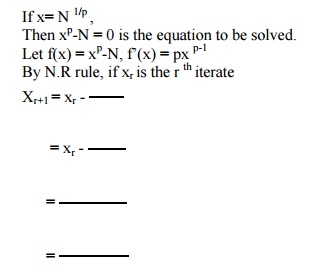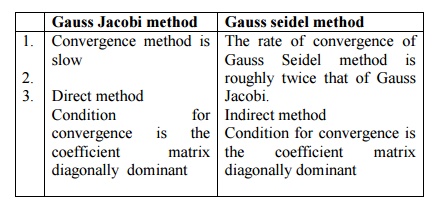Chapter: Mathematics (maths) : Solution of Equations and Eigenvalue Problems
Important Short Objective Question and Answers: Solution of Equations and Eigenvalue Problems
1. What is the order of
convergence of Newton-Raphson methods if the multiplicity of the root is one.
Sol:
Order
of convergence of N.R method is 2
2. Derive Newton’s
algorithm root of number Nth.
for finding the
Sol:
If
x= N 1/p ,
Then xp-N = 0 is the equation to be
solved.
By N.R rule, if xr is the r th
iterate

3. What is the rate of convergence in N.R method?
Sol:
The
rate of convergence in N.R method is of order 2
4. Define
round off error.
Sol:
The round off error is
the quantity R which must be added to the finite representation of a computed
number in order to make it the true representation of that number.
5. State
the principle used in Gauss-Jordan method.
Sol:
Coefficient
matrix is transformed into diagonal matrix.
6. Compare Gaussian elimination method and Gauss-
Jordan method.
Sol:

7. Determine the largest eigen value and
the corresponding eigen value vector of the matrix correct to two decimal
places using power method.
Sol:

This
shows that the largest eigen value = 2
The
corresponding eigen value =
8.
Write the Descartes rule of signs
Sol:
1) An equation f (x) = 0 cannot have
more number of positive roots than there are changes of sign in the terms of
the polynomial f (x) .
2)An equation f (x) = 0 cannot have
more number of positive roots than there are changes of sign in the terms of
the polynomial f (x) .
9. Write a sufficient condition for
Gauss seidel method to converge .(or) State a sufficient condition for Gauss
Jacobi method to converge.
Sol:
The process of iteration by Gauss seidel
method will converge if in each equation of the system the absolute value of
the largest coefficient is greater than the sum of the
absolute
values of the remaining coefficients.
10.
State the order of convergence and convergence condition for NR method?
Sol:
The order of convergence is 2 Condition of
convergence is
11.
Compare Gauss Seidel and Gauss elimination method?
Sol:

12)
Is the iteration method a self correcting method always?
Sol:
In general iteration is a self correcting method
since the round off error is smaller.
13) If g(x) is
continuous in [a , b] then under what condition the iterative method x = g(x)
has a unique solution in [a , b].
Sol:
Let x = r be a root of
x = g(x) .Let I = [a , b] be the given interval combining the point x = r. if g′(x)
for all x in I, the sequence of approximation x0 , x 1,......x
nwill converge to the root r, provided that the initial
approximation x0 is chosen in r.
14) When would we not use N-R method .
Sol:
If x1
is the exact root and x0
is its approximate value of the equation
f (x) =
0.we know that

this, method will be a slow process or may even be
impossible.
Hence the method should
not be used in cases where the graph of the function when it crosses the x axis
is nearly horizontal.
15) Write the iterative formula of NR method.
Sol:
Xn+1 =
xn
Related Topics